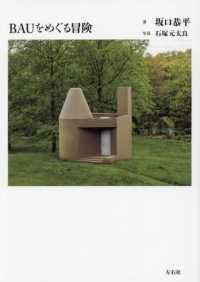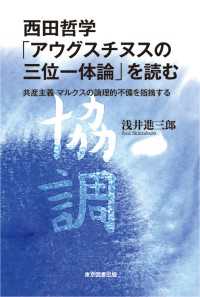- ホーム
- > 洋書
- > 英文書
- > Literary Criticism
Full Description
Romantic criticism, of which Shakespeare is the central figure, invented many of the modes of modern criticism. It is also distinct from many contemporary academic norms. Engaged with the social and intellectual currents of an age of revolutionary change, it is experimental, writerly, and individually expressive. Above all it is creative in response to the difficulties of understanding aesthetic experience in new ways, and in setting those experiences in new cultural and political contexts that Shakespeare's work helped to shape.
This book presents the main currents of these exciting but relatively little known engagements with Shakespeare, and through Shakespeare with the theory and practice of criticism, in England, Germany, and France, from the 1760s in Germany to the aftermath of the Romanticism in France. It also discusses Shakespeare in the theatre of the period--realist stagings which prefigure Shakespeare films; adaptations which fitted Shakespeare to contemporary tastes; and bare-stage experiments which foreshadow modes of contemporary theatre. A chapter on scholarship in the period shows Shakespeare as central to modern editing and historical criticism.
Much of the writing discussed is by men and women whose focus is not primarily critical but creative--poetry (Coleridge, Keats, Heine), fiction (Stendhal), drama (Lessing), or all three (Goethe, Hugo), cultural critique (Jameson, de Staël), philosophy (Hamann, Herder), politics (Hazlitt, Guizot), aesthetics (the Schlegel circle), or new original work in other media (Berlioz, Delacroix, Chassériau). It is writing directed to new modes of creating as well as new modes of understanding.
Contents
1: Introduction: Making it New
2: England: Genius with Judgement
3: Germany: 'our Shakespeare'
4: France: Revolution and After
5: Editors and Scholars: Inheritances and Legacies
6: The English Stage: the Age of Siddons
Chronology
Notes
Further Reading








